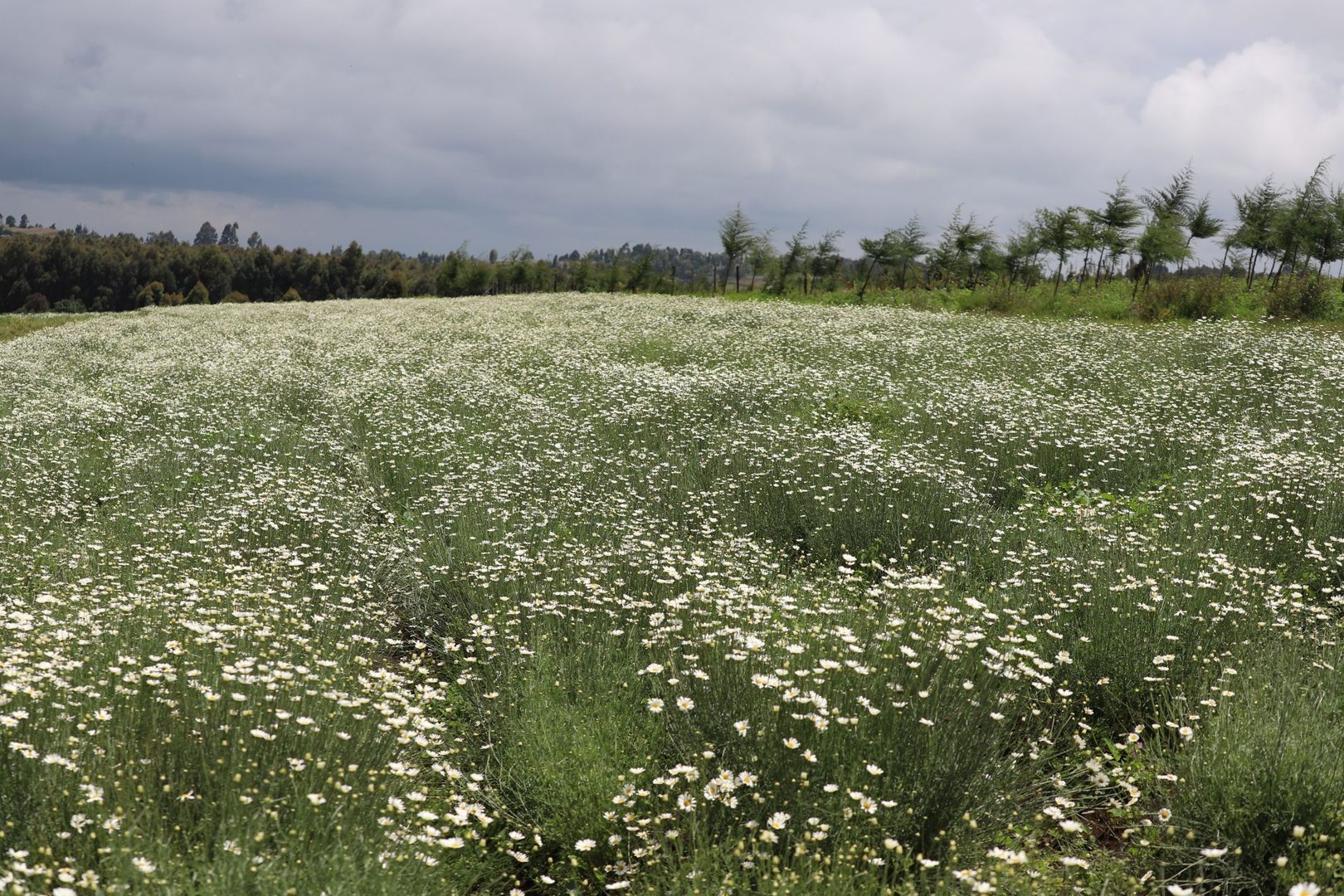Pyrethrum farming in Kenya.
- At independence in 1963, pyrethrum was one of four major cash crops after coffee, tea, and maize, and this was reflected in Kenya’s national coat of arms.
- Kenya used to produce about 70% of the world’s supply of pyrethrum.
- Kenya is said to have ideal climatic conditions for optimal pyrethrin yield and has been a preferred supplier by major markets across the globe.
- Kenya can produce over 20,000 MT per annum generating 20 – 75 million USD for farmers thereby providing livelihoods for more than 880,000 people.
With support from the Norwegian Agency for Development (NORAD), DanChurchAid is supporting efforts to revive pyrethrum farming in Kenya through the Sustainable pyrethrum market system development project in Kenya; informally known as the ‘Daisy’ Project.
Challenges overpowering the resilient farmers
In the past, hardworking pyrethrum farmers were hit with many challenges, forcing many to quit due to low productivity. These included lack of ready market for their produce; lack of drying facilities to protect harvested flowers from direct sunlight and rain; lack of knowledge on pyrethrum farming, and the impact of changing climate conditions on production. In addition, since pyrethrum is not edible many farmers resorted to planting staple food crops such as maize and vegetables
Stepping in to solve the challenges
Together with our partners, DCA is working to revitalize pyrethrum farming in Kenya. A unique partnership with Kentegra Biotechnology has seen hundreds of farmers supported with training on farming practices, land preparation, and preparation and use of manure. With support of the project, Kentegra has developed four new varieties of pyrethrum which are climate resilient and have higher yield, and 90 million seedlings and four million cuttings (splits) have been issued to farmers. Kentegra, with a mission to ‘pay farmers fairly, and pay them on time’, is availing a ready market for farmers upon harvest.
NCCK, our other partner, has been supporting pyrethrum farmers to form farmers’ groups forums which they use to champion their rights. As of December 2023, 28,000 farmers are members of Kentegra Farmers Community (KFC), a group forum which they use to project their voice in pyrethrum value chain.
DCA is playing an important role in introducing the Village Savings and Loans Association (VSLA) model to farmers through the KFCs, providing financial literacy training to enhance the farmers’ financial management skills and supporting a solar dryer subsidy scheme, where a farmer is supported to buy a solar dryer though a cost-share model. As of January 2024, 366 farmers have benefitted from the solar dryer scheme, and 513 VSLA groups have been supported and operational.

A solar dryer is a simple greenhouse-like structure that uses solar energy to dry the pyrethrum flowers which are later packed and stored for sale. Use of solar dryers helps in maintaining the colour and pyrethrin contents, unlike the traditional sun drying technique. Additionally, it boosts the safety and quality of flowers due to low temperatures which does not destroy the contents. DCA is supporting a solar dryer subsidy scheme, where a farmer is supported to buy a solar dryer though a cost-share model.
The Impact
Esther Ndutha and Peter Njoroge are some of the farmers who have benefited from the solar dryer scheme. Esther first tried her hand at pyrethrum farming in 2018 and she recalls encountering many challenges. She used to buy low quality seedlings from local vendors, which gave her low yields as the seedlings were not climate resilient. Esther also relied on sunshine to dry the flowers, however sometimes it could rain for days meaning she couldn’t safely dry the flowers. Damp or poorly dried flowers affect the buying price, and Esther was only able to get 220 shillings per kilogram (approximately 1.4 USD).
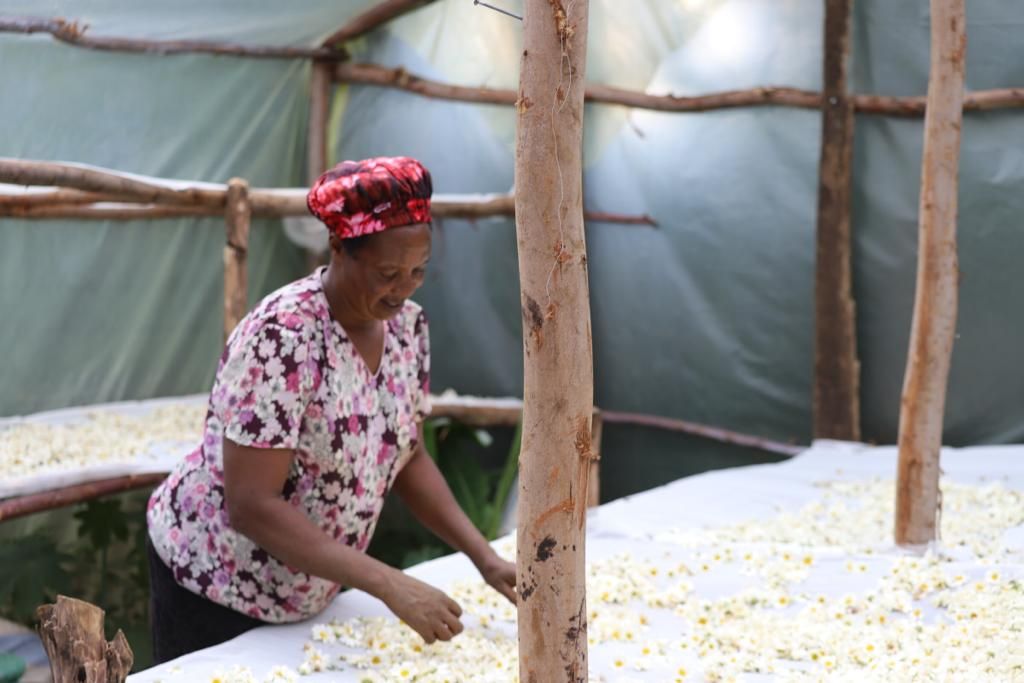
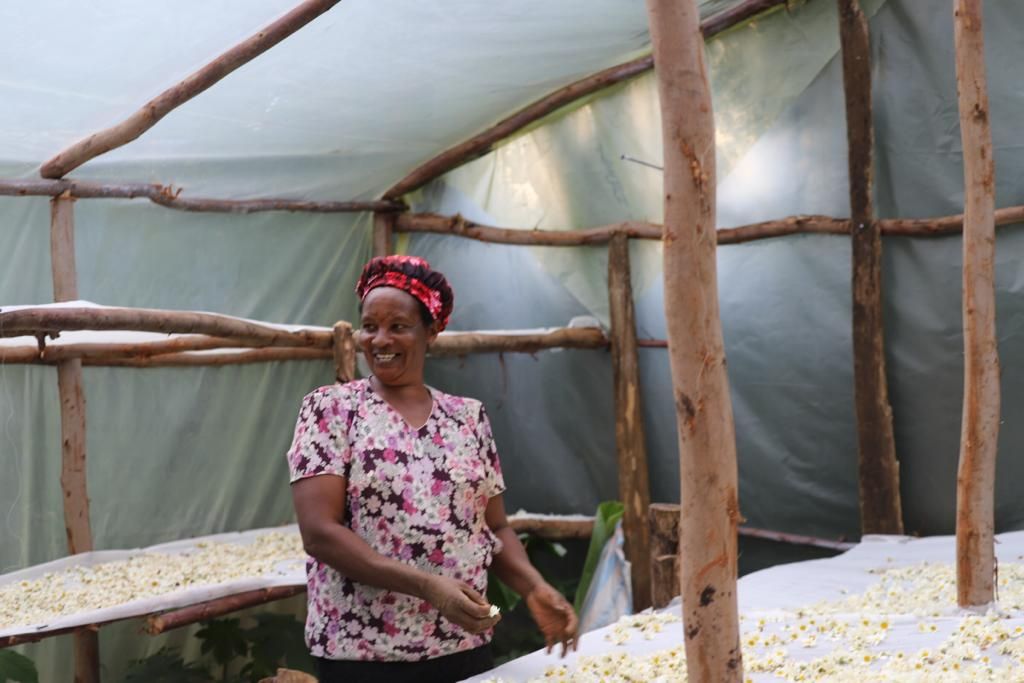
“I started farming pyrethrum five years ago, although we had many challenges I kept going until the project came and now many of the problems have been solved. I now have a solar dryer thanks to DCA and Kentegra. I can conveniently pick my flowers, dry them here (in a solar dryer) and sell them after sorting,” says Esther Ndutha.
Peter on the other hand, started pyrethrum farming in November 2022. Previously he used to do a crop rotation of maize and beans on his four-acre piece of land. He heard about the Daisy project from a neighbour and decided to try farming pyrethrum. He bought the seedlings from Kentegra and planted half an acre. Although the rains failed in 2022, Peter was not discouraged. He joined the KFC farmers forum and through it he received training on pyrethrum farming.
“Through the training I have gained more knowledge on pyrethrum farming, I’ve since expanded the land under pyrethrum to two acres from half an acre. Since April to November 2023, I’ve harvested four times. The price has also improved, nearing 300 shillings per kilogram (approximately 1.95 USD).”
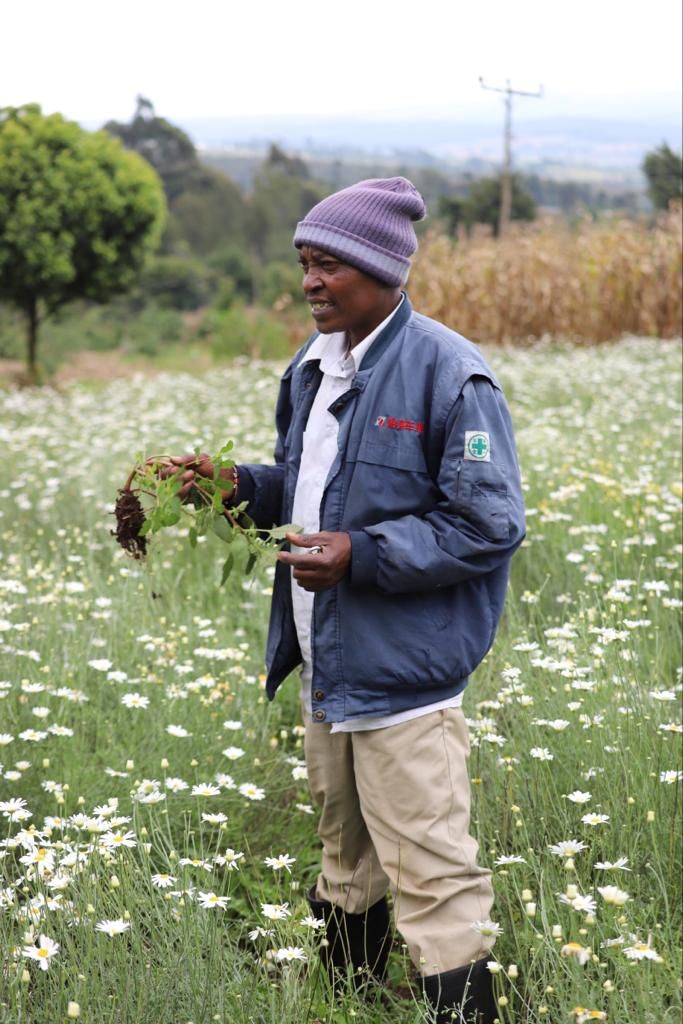
Pyrethrum flowers take little time to reach harvesting stage as compared to other crops, and can also be harvested for many months continuously. Less costs and more earnings has seen more farmers are embracing its farming.
Improving livelihoods of smallholder farmers
Other than reviving pyrethrum farming in Kenya and contributing to a sustainable business eco-system, the Daisy project also aims at improving resilience in livelihoods for smallholder farmers and workers engaged in the pyrethrum sub-sector. Faraja VSLA group, is one of the groups supported by DCA. The farmers were trainedvon financial literacy, basic bookkeeping and equipped with a calculator, inventory book, box, padlocks, cash box. Members save and borrow loans from the group at a reasonable 10% interest. Financial institutions in Kenya offer a minimum 20% interest, with loans being difficult to access for many people.
The 513 VSLA groups have, as of January 2024, saved 46 million Kenya shillings (282,208 USD) and loaned out 87 million shillings (533,742 USD) to members. Faraja group for instance has 100,000 shillings (approximately 650 USD) in savings.
“Before we formed this group, we used to borrow money from friends, shylocks or even selling livestock. Since we formed this group, every member has taken a loan to pay school fees, cater for medical emergencies, buy farm inputs and foodstuff. It is going on very well, and we hope to start poultry farming at the end of 2023 as a group business.” Josephine Anyona, chairlady, Faraja VSLA group
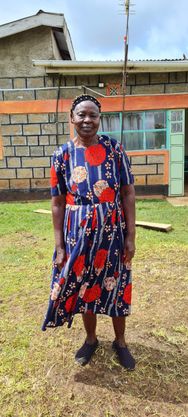
With unity and enthusiasm, the group’s dream will bloom like a daisy flower!
More about the Donor
Norad – the Norwegian Agency for Development Cooperation – is a professional body under the Ministry of Foreign Affairs (MFA). In matters concerning Norway’s climate and forestry initiative, Norad is a subordinate of the Ministry of Climate and Environment (KLD). Read more here

